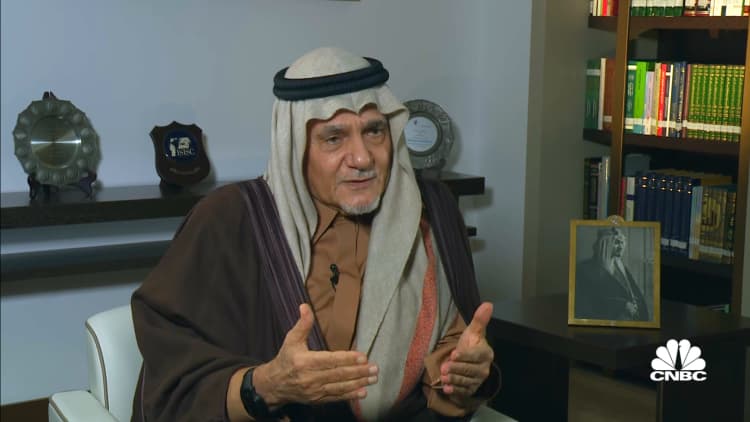
The U.S. airstrike that killed Iran's top commander showed Tehran that it can't get away with its provocations, but won't stop the country from continuing with its agenda, a former chief of Saudi intelligence told CNBC.
"The taking out of (Qasem) Soleimani definitely has been an important step to check at least some of the ambitions of Iran after its very provocative actions in the past year," Saudi Arabian Prince Turki Al-Faisal told CNBC's Hadley Gamble.
"The attacks on the oil tankers, culminating in the attack on the Aramco facilities, and there was no response," he said. "This was a sort of a wake-up call to the Iranian government and the Iranian leadership that they can't get away with it."
Tehran has denied involvement in both incidents.
However, Al-Faisal said the death of Soleimani would not halt Iran's "agenda."
"It definitely was a very important step," he said. "Whether it would stop further activities by Iran to use the methods that Soleimani was very clever in using — I don't think so."
That's because the Iranian leadership has an "agenda and a project," he said. "That project is to be the dominant representative, if you like, of all of Islam in the world."
Tehran has used "surrogates" such as Hezbollah in Lebanon and the Houthis in Yemen to advance its project, he said.
"That is going to continue," he predicted. "Maybe less efficiently than when Soleimani was alive, but inevitably, equally terroristic and, in my view, evil in its intent."
US presence in the Middle East
Al-Faisal also weighed in on the impact of U.S. troops pulling out of countries in the region.
The U.S. should have withdrawn from Afghanistan at "earlier stages when it was more doable than perhaps now," he said, citing a "missed opportunity" after the killing of al-Qaeda leader Osama bin Laden in 2011.

When asked if it is better for Iraq that American forces leave, he said: "Not today."
He recalled speaking to American and British officials at the time of the U.S. invasion of Iraq. "I remember I used to say to them that I hope that you will not leave Iraq as precipitously as you entered it."
"We've seen America pull out troops and then al-Qaeda begins operations, and then they have to push back in troops under General (David) Petraeus," Al-Faisal said.
"I don't know what type of … organization (is) coming, but it will definitely be much more complicated and more blood shedding than it is with American troops in there."
— CNBC's Amanda Macias, Joanna Tan and Natasha Turak contributed to this report.


